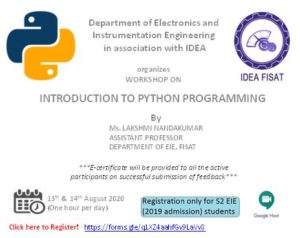Association Day Celebration
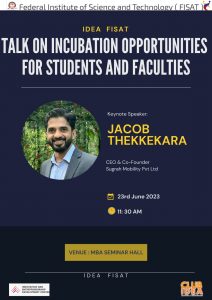
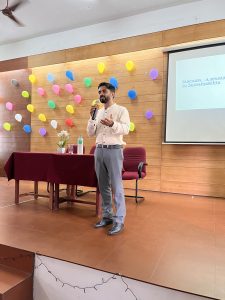
Conferences/Workshops
Association activities
National Student’s Conference on Automation & Green Engineering(NSC-AGE)
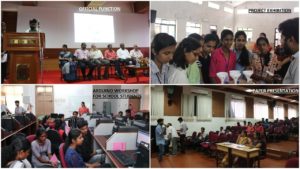
NSC-AGE-1(3-05-2019) aimed to bring together Academicians, Scientists, Research scholars and Students, to share and disseminate information on knowledge and scientific research works related to Automation & Green Engineering and confers the practical challenges encountered and the solutions adopted.
The program additionally featured two workshops, IOT workshop for college going students and Toy car making workshop for school going students.42 students actively participated in IoT workshop and 32 for school going students in Toy car making workshop. Project exhibition by final year Electronics & Instrumentation students of FISAT was organised along with this conference.
ISA FISAT Section Day 2019
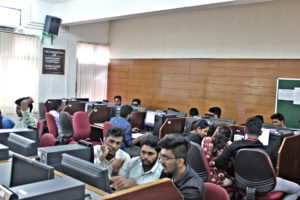
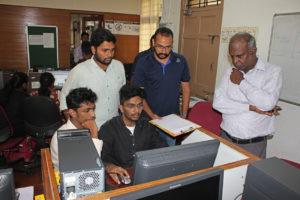
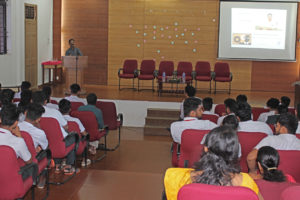
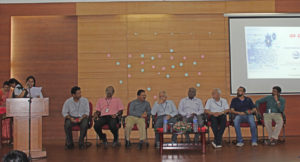
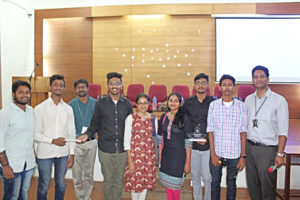
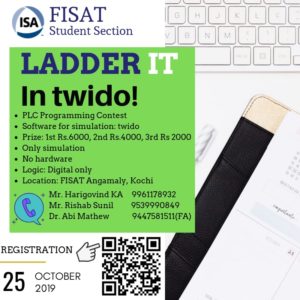
ISA-FISAT Student Section and Electronics & Instrumentation Department celebrated 25th October 2019 as ISA FISAT Section Day. Members of ISA FISAT section were actively involved in organising various events during the day. A inter collegiate PLC programming contest was conducted on the day, in which 34 students from different colleges participated. Colleges include PSG College, Coimbatore, St. Gits, Kottayam, Rajagiri, Kochi apart from FISAT. Technical partner for the conduct of LADDER IT (PLC programming contest) was CONSYST Technologies, Kochi. It was conducted from 11 am to 2 pm and Mr. Sreejith V , Project Manager of CONSYST Technologies evaluated the programs and winners were identified. From 2.30 pm to 3.30 pm , an experience sharing session by Mr. K.T. Jose, Managing Director of He Man Group of companies(Famous for their automatic multilevel car parking system) was conducted for the students followed by the valedictory ceremony. FISAT College Pricipal Dr. George Issac presided over the function and FISAT Director Dr. K. S.M. Paniker, Dean Dr. Sunny Kuriakose, ISA FISAT mentor Mr. B.Ravi felicitated the gathering. Mr Sreejith V then detailed about the evaluation and winners were announced and awarded. Owing to the technological contributions made in the field of automation, FISAT ISA Section then honoured Mr. K.T. Jose by “The ISA FISAT Person of the Year 2019” award. ISA Day celebrations were over by 4.30 pm
Workshop on “Recent Trends in IOT, LabVIEW, Verilog”
| A hands-on workshop on Recent trends in IOT, LabVIEW and Verilog was conducted for students of S7EIE from 25/07/2018 to 01/08/2018. The IOT session on Arduino was handled by Ms. Raji P,Ms. Anila Mathew and Ms. Ambily John. The Lab VIEW session for the next two days were conducted by Mr. Anish Mathew and Ms. Renu G. The fabrication of ICs and Verilog HDL session was introduced to the students by Ms. Shruthi Bhaskaran and Ms. Lakshmi Nandakumar. |
Day at FAB
| A one day visit to the FISAT Fablab was conducted for the S4 and S6 EIE students on February 16th 2019. The students were introduced to the various modern instruments that help in fabrication and development of systems by FABLAB associates and Research Associate, Mr. Neeraj P. M.
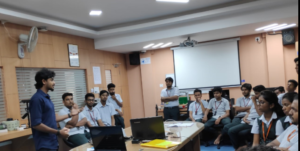
|
Career Growth in IT Field” by Mr. Alen Rintoul
| The seminar by Mr. AlenRintoul, Director of Vonnue innovations Pvt Ltd was held on 22nd Feb 2019 for the students of EIE. He has worked in a number of reputed companies like Cannon, Prcosysetc and his area of expertise is digital image processing. He explained about that learning is a continuous process and must be dealt with passionately to have a successful career, especially in IT field.
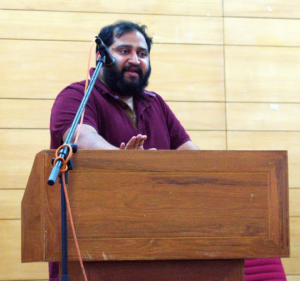
|
Technical Conclave on Future in Automation – in association with ISA Bangalore section
| Principal. Dr George Issac, dean Students Affairs, Dr. Sunny Kuriakose, Dr. Sunil Shah, President of ISA Bangalore Section, S.R.Venkatapathy Director, Trinity Advisory Corporation, Mr. Sukumaran M, Principal Consultant , Automation at IndustriConnect Technologies Pvt Ltd., Mr. Renukaprasad Belgur, Management Expert & Business Mentor and Mr. Ravi Balakrishnan, Executive Committee member ISA inaugurating Technical Conclave on future in automation. Conducted by Electronics & Instrumentation department in association with International Society of Automation(ISA)- Bangalore Section.
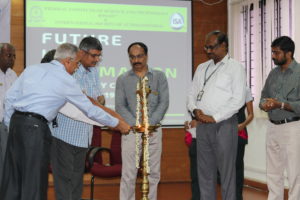
|
Activities of IDEA in academic year 2019-2020
(1)Topic : “Designing in Industry” hands-on workshop
Expert : Rahul Ravi
Date : 30-07-2019
Venue : Virtual Instrumentation Lab
The one-day workshop on “Designing in Industry” was conducted by Rahul Ravi(EIE Alumnus, FISAT), who is currently working as a Product Designer for Hortari Technologies. The main focus of the daylong event conducted for the S1 EIE students on 30th July 2019, was to give a brief on how the modern mobile applications are changing the human lifestyle, importance of design in a day-to-day life, product marketing strategies, steps in product designing, and finally the scope of a graphic designer as per the current market trends.
The afternoon session was designed in such a way that the students were given a hands-on experience in UI/UX designing using an online designing tool – Figma followed by a group activity, at the end of which they had to come up with ideas and present them in front
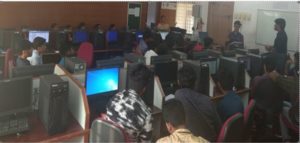
(2)Topic : Arduino Workshop
Expert : Mr. Neeraj P.M , Research Associate, FAB LAB
Date : 5th August 2019
Venue : FAB LAB
The one-day hands on workshop on Arduino was handled by Mr.Neeraj P.M , Research Associate ,FAB LAB on 5th August 2019. He explained the basic working and uses of Microcontrollers and Microprocessors with examples. The hands on session was performed using the ATmega328 in Arduino boards. Interface between Arduino and different kinds of sensors was also shown. The session was conducted for S5 EIE students.
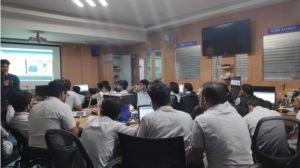
(3) Topic : Technical talk on “Development of Thinking Computer System”
Expert : Mr. Lithin K. Devasia, NETWORKZ SYSTEMS
Date : 16-10-2019
Venue : SB 218
The technical talk on “Development of Thinking Computer System “ was given by Mr. Lithin K. Devasia of NETWORKZ SYSTEMS for students of S5EIE. He explained the basics of Machine Learning and the importance of studying it. Machine learning is an application of artificial intelligence that provides systems the ability to automatically learn and improve from experience without being explicitly programmed. He also focused on the importance of Machine Learning with Python.
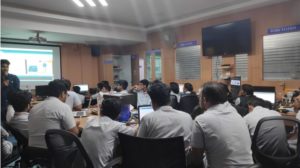
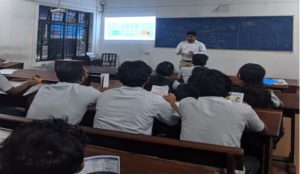
(4)EXPONENTS 2K20 – Online Project Expo
Date-13.07.2020
The Department of Electronics and Instrumentation in association with IDEA organised the online expo of the final year projects on 13/07/20. The students of final year of EIE exhbited their project in the on-line mode.
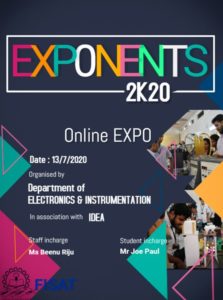
(5)PLC TRAINING LIVE WORKSHOP & BEST PROJECT EXPO by Mr. Shinto sebastian
Participants-Students from various colleges + Students of EIE(S4,S6 & S8 EIE)
The training on Programmable Logic Controller was organised by the IDEA association from July 22-24. Mr. Shinto Sebastian, resource person for the program, provided the fundamentals of the PLC through the ladder logic programming techniques. The students from the various batches of Electronics & Instrumentation Engg, Electrical Engg and Electronics and communication Engg were part of this program. The external particpants from various other colleges made use of this program for developing their programming skills of PLC. The on-line mode of exhibition of final year best projects was also conducted for the same participants for all the three days.
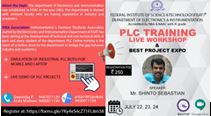
(6)Latex workshop
Participants-S4, S6 students of FISAT
LATEX, a document preparation system for producing professional-looking documents was conducted by the IDEA association for the students of various batches of EIE, ECE department. Dr.Parvathy R(HOD EEE) was invited as the resource person for the workshop in on-line mode using the OVERLEAF latex editor from 10th -12th August 2020. The workshop feeds the input to the students on publication of scientific documents through LATEX.
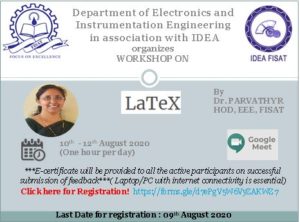
(7)PYTHON workshop
Participants-S2 EIE students of FISAT
The ‘Python Programming’ workshop was conducted by the Association of EIE department to bridge the gap in the KTU syllabus. The training on ‘Python Programming’ was delivered by Ms. Lakshmi Nandakumar, Asst.Professor of EIE department during 13th and 14th August’2020. This program intended to provide the platform for the second year students of EIE dept to learn the fundamentals of python an interpreted, high-level and general-purpose programming language.
